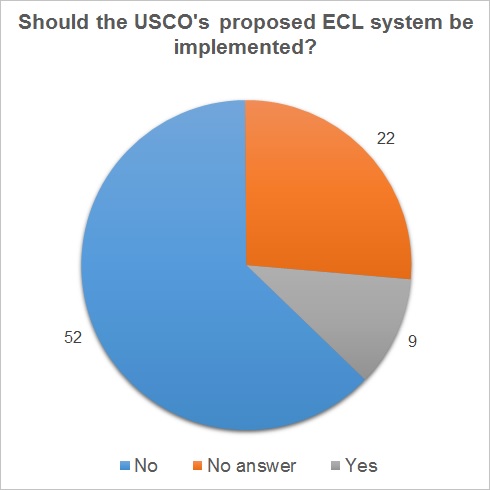
Authors Alliance recently filed a comment with the United States Copyright Office urging it to reconsider its flawed extended collective licensing (or “ECL”) proposal. The Office is currently reviewing feedback from the public on its plan to create a complicated licensing scheme that would issue licenses for mass digitization projects using private parties as statutorily empowered intermediaries.
We weren’t alone in commenting on the proposal, and it’s interesting to see who else joined in and what they had to say.
As shown in the above chart, Authors Alliance’s review of the filed comments reveals that, of the 83 submitted, only nine unambiguously supported the initiative, while 52 commenters wrote in to oppose it—at least pending considerable revision. Who these commenters are is also revealing: the dissenters represent a broad coalition of creators’ groups (including Authors Alliance), libraries, public and private interest groups, and individual authors. The diversity of voices speaking out against the current proposal is a testament to its incompleteness. Communities like our own, that want to see workable solutions for mass digitization, are joined by individuals and interests who are more skeptical of the whole project. We are unified in a belief that the existing proposal is unlikely to advance its lofty goals, but might instead undermine the rights and interests of the diverse authorial community.
Unsurprisingly, those most in favor of implementing the Copyright Office’s ECL regime, as proposed, are those who have the most to gain: collecting societies and organizations that wish to act as collecting societies. While establishing an administratively complex licensing scheme geared largely toward commercially unavailable works does not seem likely to be a meaningful contributor to individual authors’ incomes, it could certainly prove to be a windfall to the organizations that would receive a portion of all collections. In all, seven of the nine supporters are collecting societies or express interests in serving as such.
There is every reason to believe that everyone involved in this process—collecting societies included—is working in good faith to find the right way to realize the promise digital availability has for long-unavailable works of authorship. Collecting societies have a part to play in our digital economy, and their say is important. But we should not let the collecting society tail wag the public and authorial interest dog, nor should we let the promise of a near-universal digital library or, perhaps, of a large payday, blind us to the shortcomings observed by the vast majority of commenters.
Discover more from Authors Alliance
Subscribe to get the latest posts sent to your email.
